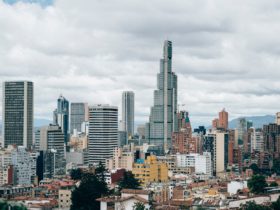It doesn’t matter if you’re an employee who needs to travel to another city on business, a manager sending their team on a business trip or an Office Manager planning and booking Business Travel for anyone in the company, you need to make it as seamless and efficient as humanly possible.
Booking Business Travel can be a huge logistic challenge for everyone involved but don’t worry, we’re here to help.
On this post we want to shed light on how to choose the best area to stay for Business Travel.
Table of Contents
1. Document Yourself
The first thing you need to do is a little research on your destination.
Some questions you need to ask are:
Where are the meetings taking place? What is the accommodation like in that district? Are there subway, rail, or bus stops nearby? What’s the road connectivity like? Are there any restaurants and shops around?
During your destination research phase, Google Maps will certainly become your BFF.
And you can always count on our Destinations section to make things easier.
2. Keep the goal of the trip as the top priority
Whether you’re planning an important business meeting in central Tokyo, a new market research expedition to a developing country or a visit to an agricultural trade show in rural Ohio, when it comes to choosing the best area to stay for a business trip, intent is everything.
2.1 Book your stay near the area where most of the action will take place
If you’re planning a visit to an event, conference or trade show, choose an area close to or accessible from the venue where the event is going to be held.
The same rule applies to visits to a different branch, a single-client visit or training at a specific venue. Close to the action is probably the best.
If the goal of the trip is to meet different clients, triangulate their addresses and choose a place close to the middle.
2.2 Choose areas with good transport connections
Time efficiency is a key point when organizing a business trip.
When traveling on business to cities with efficient public transport connections, you can save money on car rental by choosing accommodation in neighborhoods that are well-connected to the place where the meetings are to be held.
In most cases, hotels don’t have to be right next to the venues, they can be anywhere in the city provided train or subway connections allow for an easy commute.
In more rural areas or cities where a car is absolutely necessary, districts with good road connections should always be preferred.
3. Consider the Costs
Sometimes choosing an area next to the place you need to be at can be really expensive, especially during big trade shows or in the most central neighborhoods of big cities.
In these cases, you can bring costs down by choosing accommodation that is not as central. However, as mentioned above, time efficiency is very important, so good connections should always be considered.
Staying in far away areas can definitely bring accommodation costs down. However, faraway places are also likely to lack efficient public transport, so transportation costs can rise quickly if the person traveling needs to travel miles for a meeting or a meal.
You should also consider the type of accommodation that will better suit the purpose of the trip.
Of course, everything you do should closely follow Corporate Travel Policies.
4. Whenever Possible, Take the Traveler’s Opinions into Consideration
Sometimes, the best approach is to give the person traveling a budget and let them find their own accommodation. Maybe they want to stay in an area removed from where they need to be for legitimate reasons. Maybe they don’t like the location, maybe they have other plans not related to work.
Remember: Business Travel is not always perceived a prize or a perk. Taking personal opinions and feelings into consideration when booking Business Travel anywhere in the world is important. It will feel like less of a burden for the traveler and it will make them feel happier and in control.
If costs are a concern and the traveler insists on staying somewhere else, then they can make it up other ways, like extra hours while on the trip or covering the extra costs from their own pocket.
This approach has several advantages, the main one being that it puts all the hassle of finding accommodation on the person traveling. Less work for you, more freedom for them. A win-win situation.
Did you enjoy this post? What strategies do you put in place when choosing accommodation for Business Travel? Let us know in the comments.













